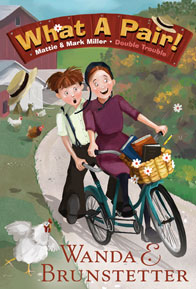 When I thought about creating a series of children’s books, I wanted them to tell the stories of an adventurous Amish child. I've spent a great deal of time with children from the Amish communities and I adore them and find them so facinating.
When I thought about creating a series of children’s books, I wanted them to tell the stories of an adventurous Amish child. I've spent a great deal of time with children from the Amish communities and I adore them and find them so facinating.
 This is how Rachel Yoder, the curious, fun-loving main character of my new Always Trouble Somewhere Series came to be. By reading about Rachel, you will not only enjoy an entertaining story, but also learn facinating things about the Amish way of life.
This is how Rachel Yoder, the curious, fun-loving main character of my new Always Trouble Somewhere Series came to be. By reading about Rachel, you will not only enjoy an entertaining story, but also learn facinating things about the Amish way of life.
The Amish still live much like the pioneers of the early days. Due to their religious beliefs, they live a plain life without the use of many modern tools.
 The Old Order Amish wear plain clothes, similar to what the American pioneers used to wear. They believe electricity is too modern, so they use kerosene, propane gas, coal, diesel fuel, and wood for heating their homes, cooking, and running their machinery and appliances. Telephones are not allowed inside their houses. Their transportation around the area is by horse and buggy.
The Old Order Amish wear plain clothes, similar to what the American pioneers used to wear. They believe electricity is too modern, so they use kerosene, propane gas, coal, diesel fuel, and wood for heating their homes, cooking, and running their machinery and appliances. Telephones are not allowed inside their houses. Their transportation around the area is by horse and buggy.
Once they leave school, Amish children learn a trade so they can get a job and help earn money to support themselves and their families.
NEW CHILDREN'S BOOKS
Meet Rachel's twin friends and their brand new children's series that's coming in June 2012. . .
Mattie and Mark Miller. . .Double Trouble series.
Book 1 -- "What a Pair!"

Books are available at your local Christian bookstore.
They can also be ordered online at www.amazon.com, www.christianbook.com,
and many other places.